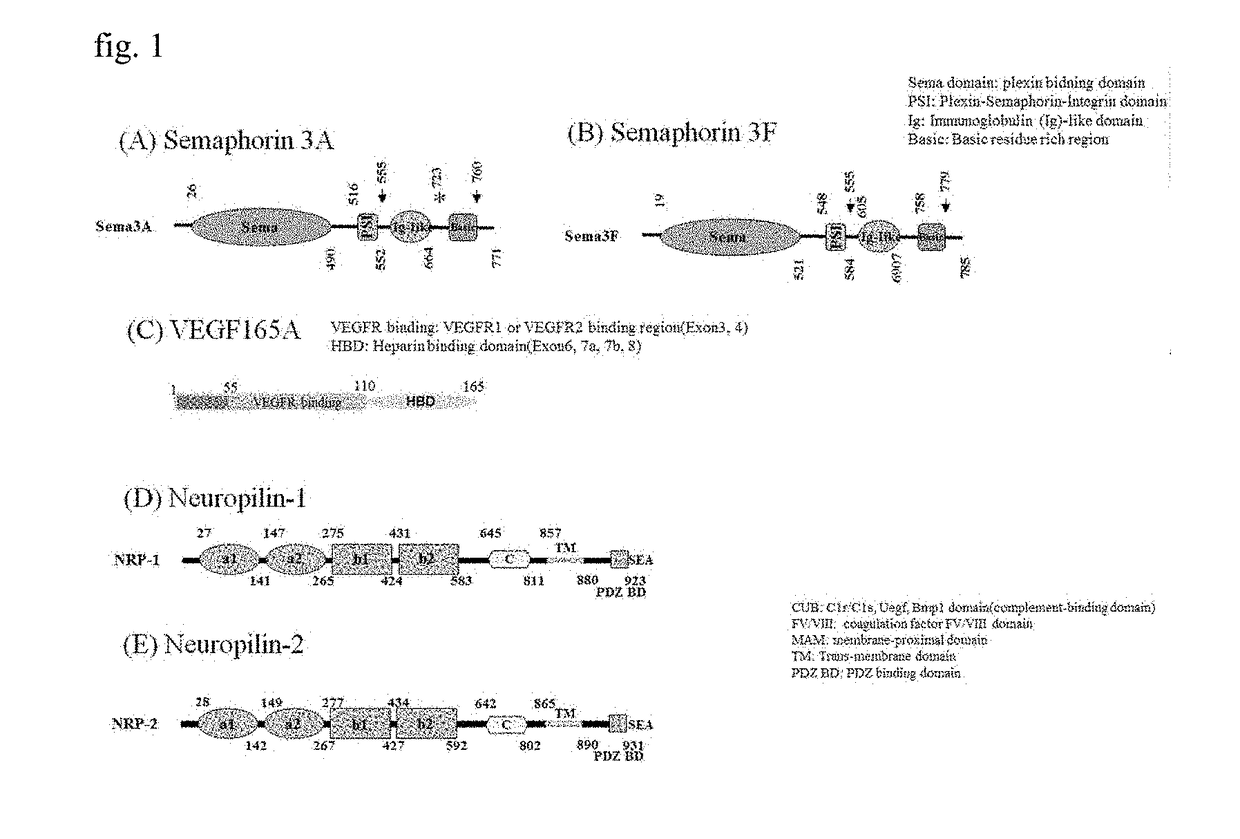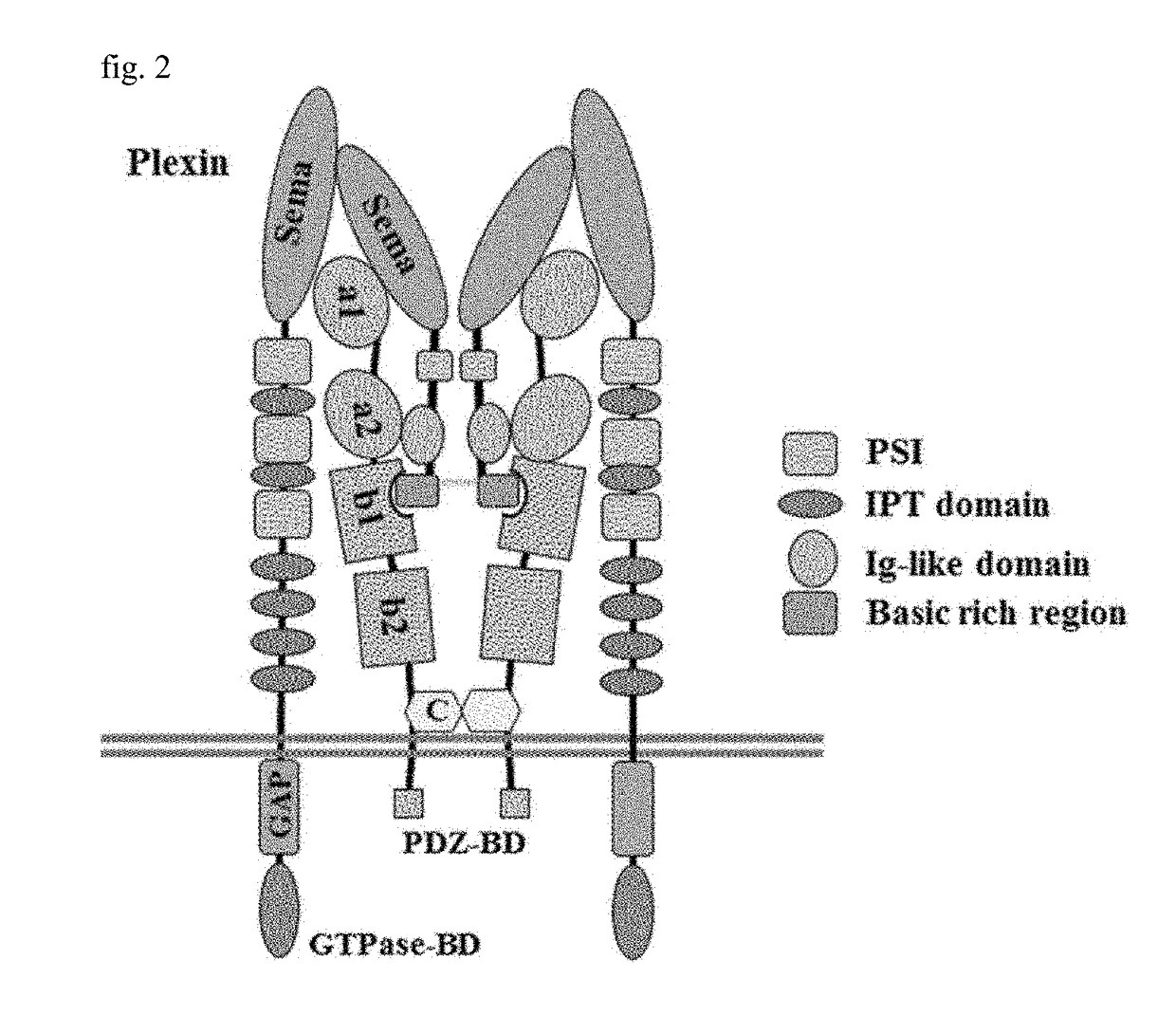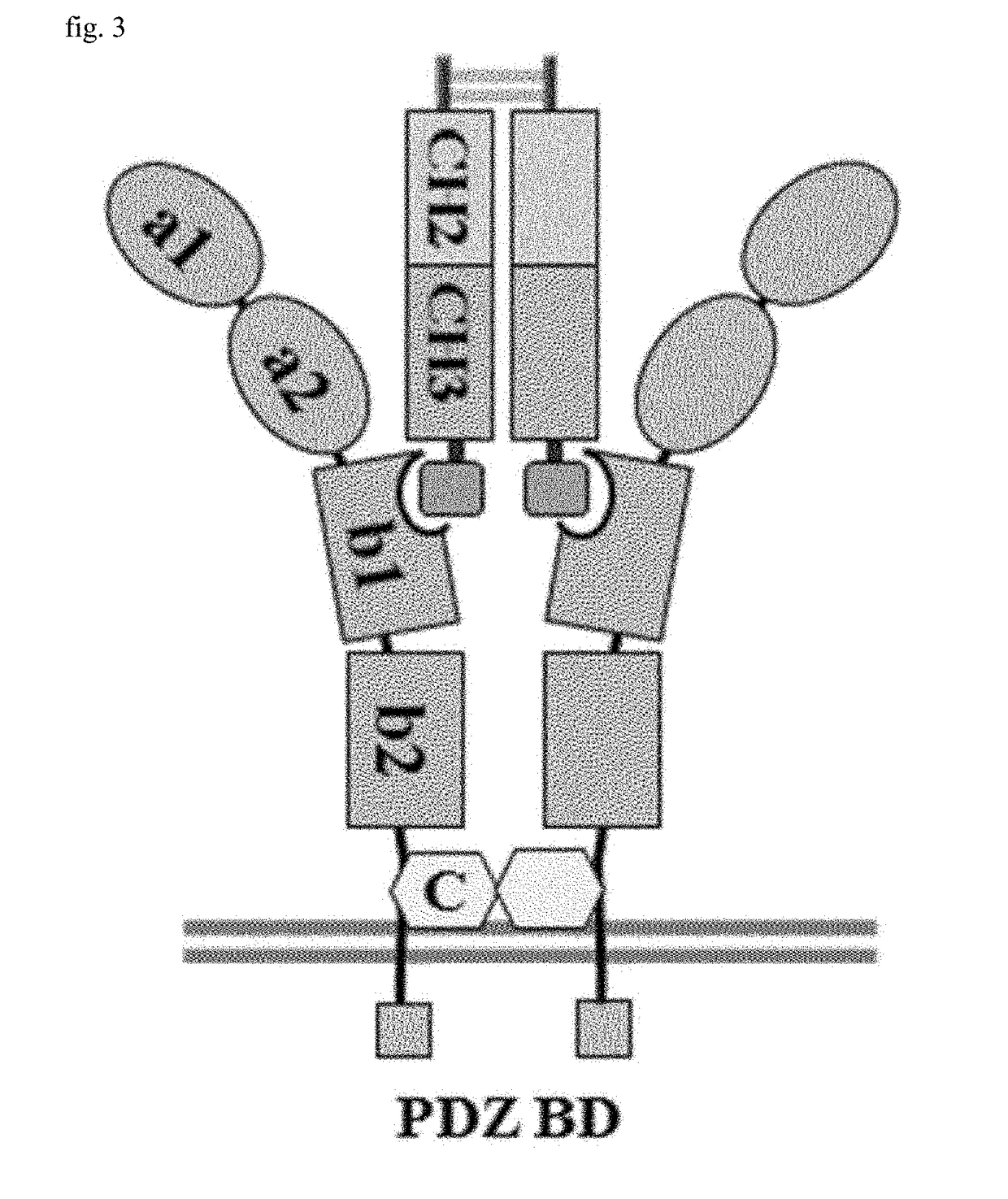Tumor tissue-penetrating peptide specific to neuropilin and fusion protein having same peptide fused therein
a peptide and tumor tissue technology, applied in the field of tumor tissue penetrating peptides, can solve the problems of limited antibody treatment effect, short half-life, and insignificant improvement of antibody efficacy, so as to increase infiltration, promote extravasation, and increase tumor suppressing activity in vivo
- Summary
- Abstract
- Description
- Claims
- Application Information
AI Technical Summary
Benefits of technology
Problems solved by technology
Method used
Image
Examples
example 1
f Class 3 Semaphorin Ligands Derived Peptides Specifically Binding to Neuropilin and Peptides with Increased Affinity with Neuropilin
[0076]In order to induce peptides specifically binding to neuropilin, sequences of ligands known to bind to neuropilin, i.e., vascular endothelial cell growth factor (VEGF-A, B, C, D), semaphorin 3-A, B, C, D, E, F (class 3 semaphorin), fibroblast growth factor-2 (FGF2), hepatocyte growth factor (HGF), and galectin-1 were analyzed.
[0077]Representatively, the whole sequences of VEGF-A and class 3 semaphorin were selected from the PubMed Entrez Protein Database.
[0078]As illustrated in FIGS. 1(A) and 1(B), secreted class 3 semaphorins (Sema3s) were identified from semaphorins 3A to 3G, and they have three domains in common. Upon investigation from the N-terminus, a sema domain is a site binding to plexin, an Ig-like C2 type domain is a site binding to neuropilin a1 and a2, and a basic rich region is a site exposing a portion capable of binding to neuropil...
example 2
ion of Fc-TPP where a Tumor Tissue-Penetrating Peptide (TPP) is Fused in an Antibody Heavy Constant Region Fc
[0090]In order to perform experiments on the length of linkers for introducing four types of peptide sequences designed in the above Example 1 into C-terminus of a constant region Fc of a human antibody IgG1, linkers having 4 amino acids consisting of glycine, serine, and alanine, or 15 amino acids were selected. The selected linkers have sequences of GAGA (SEQ ID NO: 11) and (GGGGS)3 (SEQ ID NO: 12). The clone names and sequence information are shown in the following Table 4.
[0091]
TABLE 4Amino acid sequence fusedto C-terminal of FcLength(from N-terminusofto C-terminus)entireTPPLinkerNeuropilinaminoSEQ IDNamesequencetarget sequenceacidNO.4A22GAGAHTPGNSNEWKHLQEN26SEQ IDKKGRNRR (SEQ IDNO: 5NO: 1)15A22GGGGSGGGHTPGNSNEWKHLQEN37SEQ IDGSGGGGSKKGRNRR (SEQ IDNO: 6NO: 1)15A22pGGGGSGGGHTPGNSNKWKHLQEN37SEQ IDGSGGGGSKKGRPRR (SEQ IDNO: 7NO: 2)4F22GAGAREAPGAPRSPEPQDQ26SEQ IDKKPRNRR (SEQ ID...
example 3
pression and Purification
[0096]Proteins were expressed using transient transfection of plasmid (FIG. 4) encoding each Fc-TPP constructed in Example 2 above, with HEK293-F system (Invitrogen). In a shake flask, HEK293-F cells (Invitrogen) which were suspended and grown in the serum-free FreeStyle 293 expression medium (Invitrogen) were transfected with a mixture of plasmid and polyethylenimine (PEI) (Polyscience). When transfecting 200 mL in the shake flask (Corning), HEK293-F cells were seeded in 100 ml medium at a density of 2.0E*6 cells / ml and incubated at 120 rpm, 8% CO2. Thereafter, plasmid encoding Fc-TPP was diluted in 10 ml FreeStyle 293 expression medium (Invitrogen) to be 250 μg (2.5 μg / ml), and mixed with 10 ml medium where PEI 750 μg (7.5 μg / ml) was diluted to be reacted at room temperature for 10 minutes. Then, the reacted mixture medium was put into the 100 ml seeded cells and incubated at 120 rpm, 8% CO2 for 4 hours, and then the other 100 ml FreeStyle 293 expression m...
PUM
| Property | Measurement | Unit |
|---|---|---|
| pH | aaaaa | aaaaa |
| pH | aaaaa | aaaaa |
| pH | aaaaa | aaaaa |
Abstract
Description
Claims
Application Information
 Login to View More
Login to View More - R&D
- Intellectual Property
- Life Sciences
- Materials
- Tech Scout
- Unparalleled Data Quality
- Higher Quality Content
- 60% Fewer Hallucinations
Browse by: Latest US Patents, China's latest patents, Technical Efficacy Thesaurus, Application Domain, Technology Topic, Popular Technical Reports.
© 2025 PatSnap. All rights reserved.Legal|Privacy policy|Modern Slavery Act Transparency Statement|Sitemap|About US| Contact US: help@patsnap.com



